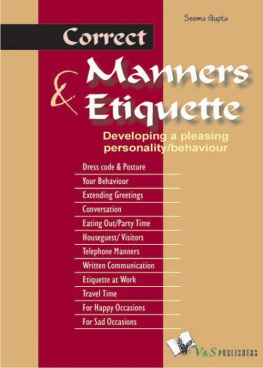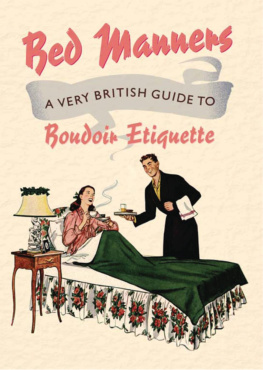
Developing a pleasing
personality/behaviour
Seema Gupta

Published by:

F-2/16, Ansari road, Daryaganj, New Delhi-110002
 23240026, 23240027 Fax: 011-23240028
23240026, 23240027 Fax: 011-23240028
Email:
Branch : Hyderabad
5-1-707/1, Brij Bhawan (Beside Central Bank of India Lane)
Bank Street, Koti Hyderabad - 500 095
 040-24737290
040-24737290
E-mail:

Copyright: Author
ISBN 978-93-813841-5-2
Edition: April 2011
The Copyright of this book, as well as all matter contained herein (including illustrations) rests with the Publishers. No person shall copy the name of the book, its title design, matter and illustrations in any form and in any language, totally or partially or in any distorted form. Anybody doing so shall face legal action and will be responsible for damages.
PREFACE
The other day I went to a restaurant with my friends for lunch. Though the place was full, we managed to get a table. The waiters were rushed off their feet, scurrying from table to table. Over the noise in the restaurant we heard a Shishshishing sound coming from a corner. On turning towards it, we found it was a group of business executives trying to attract the waiters attention. One of them, apparently getting restless with the delay in service, was summoning the waiter by clicking his fingers and making strange sounds to attract his attention. When the waiter finally reached this table, the disgust on his face was quite evident.
What a glaring contrast there was between this group and a couple sitting near our table, who, too, were trying to get the waiters attention. It was the manner in which they went about it that was so different. Waiting patiently till he caught the waiters eye, this man held up his index finger up and said Excuse me. The waiter promptly came to their table and took their order with all due courtesy and smiles. The marked difference in both behaviours probably never occurred to the impatient group. So used to getting their own way at once, it may never have crossed their minds that there could be something wrong in the manner they went about it.
Such incidents are commonplace and so are ill-mannered people. Actually, most people whose behaviour strikes others as bad or ill manners have conducted themselves in this manner for so long that it has turned into a habit and comes naturally to them. It is only when they come across someone with better etiquette that comparison takes place and the realization strikes a home run.
Good manners today are in a state of flux as they were never before. One can no longer turn to the rules that worked 50 or maybe even 20 years ago. Formal and rigid in outlook, they have little to do with the casual lifestyles that prevail today. However, there is one factor that has remained constant. And this is that your actions and behaviour will be observed by everyone; and unfortuantely, a wrong first impression is more lasting than any number of good deeds that may follow. You will be observed equally by strangers as well as by people who matter to you. And, I am sure, that at least for the latter, you would like to be at your best.
Sound manners and good etiquette are based on the three most endearing of all human traits kindness, thoughtfulness and consideration for others. That is why teaching your children basic manners takes top priority. It is your duty to show them the right path and they only learn what you teach them or emulate whatever you do yourself. At this young age, any adult with whom they are in close contact is their ideal and they try to imitate that person in every way be it greeting someone cheerfully or hiding in your bedroom to avoid that person; digging your nose, cleaning your ears or scratching your head in public or in the privacy of your bathroom children have an uncanny sense of perception and memory. So be a good model for them. Teach them the best of manners just like you provide them with the best of food, clothes and education.
This will help you achieve your goal. It helps you to conform and encourages you to do the right thing at the right time. Etiquette and manners at home, with visitors, guests, at the office, introductions and greetings, various forms of address, written communications, salutations, conduct during various ceremonies like births, weddings, anniversaries, deaths and funerals, parties, picnics are all dealt with in this book in detail.
Within any social ambience, if you find yourself in an unfamiliar situation, this book will help you come out of it. Just go through it and be assured of smooth sailing henceforth.
Seema Gupta
CONTENTS
ETIQUETTE THE KEYWORD
Lord Tredegar knew exactly how to handle a habit of several years. One of his servants reported this incident I remember the morning when Lord Tredegar was taken exceedingly ill. Instead of the usual nod of his head to me on my arrival, he said, Cronin, I think Im dying.
The years-old habit could not be amended in a moment. I knew that even Lord Tredegar in his more collected moments would not wish it so. So correctly I replied, Very good, my Lord, Thereafter, the normal silence between us was reestablished to our mutual satisfaction.
E tiquette and good manners are acquired through constant JL/ practice. They are inculcated from childhood and become habits by the time we grow up. Remember the times when you were irritated by your mothers constant nagging to clean up the mess in your room. But she was only trying to help you by merely cultivating the good habit of tidiness in you such is the case with good manners.
Can the ability to get along with others be learnt or is it a trait that you are born with? While there are people who appear to be born charmers, most of us have to learn how to relate to others. Even the charmers often find that they have to refine their skills of communication. Do we all not envy that charming, selfconfident fellow who moves with grace? He has the ability to turn even the most embarrassing situations into playful witty moments by his intellect and good-natured humour. A person with a fine sense of etiquette exudes confidence. He is able to put everybody at ease, unmindful of their social rank or status.
Several years ago, John D. Rockfeller said, The ability to get along with people is as purchaseable a commodity as sugar and coffee, and I pay more for that ability than any under the sun.
Good manners are essential in building good relationships with other people and they can ensure that you have a steady supply of support and cooperation.
The practice of etiquette can be traced back to the times of kings and emperors where the courtiers bowed before the royal family. The elders received due respect and youngsters never spoke harshly to their parents.



















 23240026, 23240027 Fax: 011-23240028
23240026, 23240027 Fax: 011-23240028